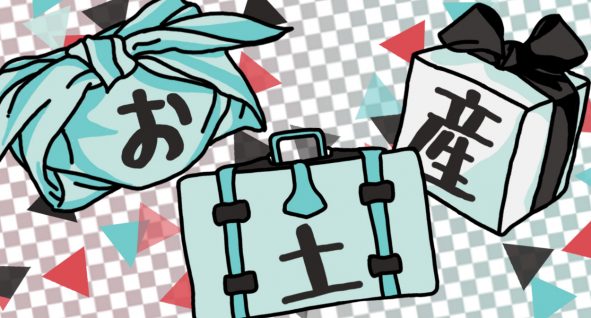
What to Pack – School Exchange to Japan
#1 Introduction
When I went on a high school exchange year with AFS, I did not know what to bring. Since it’s summer and a fresh batch of exchange students will be going abroad soon, I’ve decided to write a guide on what to pack.
Enjoy!
#2 What to Pack
Passport, Plane tickets, Visa
This will come as no surprise to anyone, but it’s always good to be reminded of it. Most exchange organizations will send you your tickets via email, so make sure you have your boarding pass printed out in advance.
Depending on the organization you are going with, you will have to apply for your visa on your own. If not, the organization will most likely need your passport to apply for you. Either way, make sure you have both ready before leaving for the airport.
Host Presents / Omiyage [お土産]
You are being hosted by a family for a semester or year, and with most good exchange organizations, the host family doesn’t receive any monetary compensation for taking you in. Because of this, it is important to show your gratitude from the very beginning.
In Japan, bringing gifts when traveling or when staying with somebody is an important part of the culture. Some things to be aware of:
- Make a list of everyone you are planning on giving things before shopping, it’s going to be a long list and it’s easy to forget somebody.
- You will need a lot of small gifts for your classmates [expect up to 45 people, there were 43 in mine], your school club members, your teachers and head master, fellow exchange students and Volunteers and of course your host family. Make sure to include your host grandparents in this, they will be pleasantly surprised. I spent a lot of time at my school library studying Japanese while my class had subjects I had no way of following, so I wish I had brought something for the librarian as well. Bring extras.
- Food is your friend. Apartments in Japan are usually not too large, and most people in Japan have little use for clunky souvenirs. If you can find some local speciality that comes in a big box, go for it. Special biscuits or the like. I bought a kilogram of Viennese candy and handed it out at school and at my AFS camps. It lasted about a month.
- Get bigger gifts for your host family, homeroom teacher and headmaster. In Japan, there is a strong hierarchy and it is important to show extra gratitude to the people who will play the biggest role during your exchange.
For a full guide on Gift giving in Japan, including tips on wrapping and more information on omiyage click here: A Guide to Giving Gifts in Japan.
A Journal or Diary
I didn’t have a Diary before coming to Japan and I stopped writing in one after I returned, but I find having one for your year abroad really nice. It helps you collect your thoughts and it’s so much fun to look back afterwards.
A 4×3 cm Passport Photo
You do not know how often I needed one of these – for my residency card, school ID, medical ID and AFS Card. You never know for what you need to register with a photo. The standard size in Japan is 4×3 cm, so make sure it fits in there.
Information on your Home Country
A great way to start a conversation is to share information about your city or country. Especially when your Japanese isn’t great yet, talking about things you are familiar with will really help. Some good things to bring include:
- A map of your city
- A postcard set of all of the famous attractions
- Some recipes for local speciality
All of these things can be googled as well, but it’s always nice to have something tactile with you to help you talk. This is especially helpful since a lot of schools in Japan don’t allow you to use your mobile phone.
Clothes
 A good rule of thumb is to bring enough clothes for a week and a half, and then just wash those. You don’t need to bring your entire wardrobe, and you will probably buy stuff during your exchange as well. Pack one or two formal outfits,
A good rule of thumb is to bring enough clothes for a week and a half, and then just wash those. You don’t need to bring your entire wardrobe, and you will probably buy stuff during your exchange as well. Pack one or two formal outfits,
Shoes
You will need to slip in and out of your shoes a lot, be it at your school or at a restaurant. Pack shoes that aren’t too flashy and can easily be taken off and put back on. It will save you so much time.
Shoes are heavy though so I wouldn’t recommend packing more than a pair. You will most likely have to buy special slippers or shoes for school anyways, as the entire student body usually has matching shoes.
School Uniform
You will most likely have one. Unless you are going to a private school in most of the country or a public school in Nagano prefecture, the chance of you having to wear a uniform is pretty high. Your exchange organization might help you find a used one for free or very cheap, I know that AFS Japan does. If not, just talk to your homeroom teacher or host family, they will be happy to help.
Everyday Clothes
Since you will have to wear your school uniform a lot, bring a few outfits to wear after school or on weekends were you do not have to attend school clubs. Depending on where you are, the style of clothing and climate will be different, so make sure to google your area before packing. Since you are an exchange student and are representing your country in a way, try not to be too flashy with your clothes, you will stick out enough as is. [Unless you are placed in Harujuku, then go crazy.]
Hygiene
You might need some of these, others can be easily purchased in Japan or online. During your first few weeks in Japan you will probably have enough on your mind that you don’t have the time to look for a good deodorant.
 Make-Up
Make-Up
Japan has a lot to offer, although a lot of stuff might not be great for your skin type. This is especially true for foundation and concealer, as the products available might not match your skin tone. Bring your favourites, but everything else can probably purchased online or in Japan.
Deodorant
Pack your favourite, and bring spares. It’s probably easier that way
Toothpaste and Toothbrushes
Japanese toothpaste is weird. Most of it doesn’t contain fluoride, so you’d have to check the packaging for the ingredient. It’s especially important since dentists in Japan are really hit or miss, and the latter is sadly more prominent. You will be able to find good toothbrushes though, so no need to bring spares there.
Medication
Like any extended trip, bring the stuff you need, but make sure to check what is legal in Japan, as there are relatively strict restrictions. Check this website for details on importing medication. You wouldn’t want to go to Japanese jail. Also make sure to have the original prescriptions with you at all time during your flight, and bring spares.
Electronics
Your Phone
I’m not sure whether to recommend bringing your phone or not, on the one hand, you can get free wifi at most konbinis and train stations, on the other, the regulations surrounding getting a sim card for Japan and the difficulties some phones have with the cellular networks in Japan make it somewhat hard. AFS will give you a brick phone with a 2 month prepaid card included. I just continued using this phone, and only used my other phone to communicate with my classmates on LINE and staying active on social media.
A huge plus of not bringing your phone with you everywhere is that you are somewhat forced to interact with people more and are not constantly pulled back into your ‘old world’ back home. I enjoyed not having my phone all the time, but whatever you prefer.
A Camera
I’d recommend you bring a proper camera, and so many exchange students I have talked to regret not bringing theirs. Even though you are primarily there for school, you will most likely travel a bit and it is so much fun to document your day-to-day life as well. I took around 15.000 photographs on my DSLR during my stay and I do not regret it.
Your Laptop
Although you shouldn’t be online all the time, it is nice to have your laptop to import photos, occasionally skype with people back home and prepare presentations about your exchange or your country for school.
Make sure to ask your host family about any rules they might have, especially if you have host siblings who have to follow them as well. It’s almost always better to spend time with your family than to spend it online, but it’s still nice to have your laptop at hand.
Bring a backup disk that doubles as a hard drive to transfer data around, and leave a backup at home just in case. You never know what could get lost or stolen during your travels.
Money
Make sure you know where your card is accepted in Japan, 7/11 ATMs take most cards, the post office takes a few. FamilyMart is also increasing the amount of international cards that they accept at their ATMs. I wouldn’t recommend getting a bunch of cash converted in advance as it is usually more expensive,
#3 Leave a lot of Space
You will buy a lot of thing. Out of all the exchange student with me in Japan, not one of them didn’t have to send home a package at the end of their stay. My box was 35kg. So, in order to save some shipping costs it’s probably better not to over pack. My suitcase was around 15kg when flying which left a lot of room for presents, clothes and Japanese stationery. I also bought a lot of books, which are super heavy but really cool, so keep that in mind as well.
#4 Digital Suitcase
Apart from your physical suitcase, it would also be cool to get your digital devices ready for your trip. While your internet connection is steady and you have enough time to download stuff, here is what you need to have:
 A Translation App
A Translation App
Google Translate lets you download languages, and the camera lets you quickly look up things on the go. There are other good dictionary apps to have, so look around for one that works for you and offline.
Scans of your Documents
To be on the safe side, get scans of your passport, visa and social security card and have them on your laptop and phone. You never know when they might come in handy.
A Language Study App
If you happen to have some spare time during your stay, for example during your commute to school, you could always learn some vocabulary or grammar on your phone. Try a Japanese podcast!
Kindle Ebooks
Books are heavy, and since you have an address in Japan, you can use it to register for a Japanese Amazon account. Reading in Japanese is really helpful and having a kindle allows you to continue purchasing books when you are back in your home country. There are other ebook providers out there, but Amazon has worked for me so that’s what I have been using. During Prime Day, you can also get a physical kindle for super cheap, a good investment.
#5 Wrap-Up
And that is all I have for you today, I hope this little guide helped you with what to pack. Know ayou are ready for your exchange. If you have any questions about the exchange year in general, don’t hesitate to leave a comment or use the contact form for longer questions!
Thank you so much for reading, you can my general advice here: Exchange Year Advice – AFS Japan, information on the AFS Camps and activities here, here and here.
Posts about attending school in Japan: Attending a Japanese High School and Japanese High School Clubs.
See you next time,
Send a postcard,
Yona

thank you so much, this will help me a lot! I’m spending my year in yokohama 🙂
I’m so glad it helped! Have a great exchange!!!
This was so helpful! Btw, I’m @1.800.traveler on Instagram:) you helped me understand more about Japan exchange and more! Thanks a lot ❤
thank you so much!